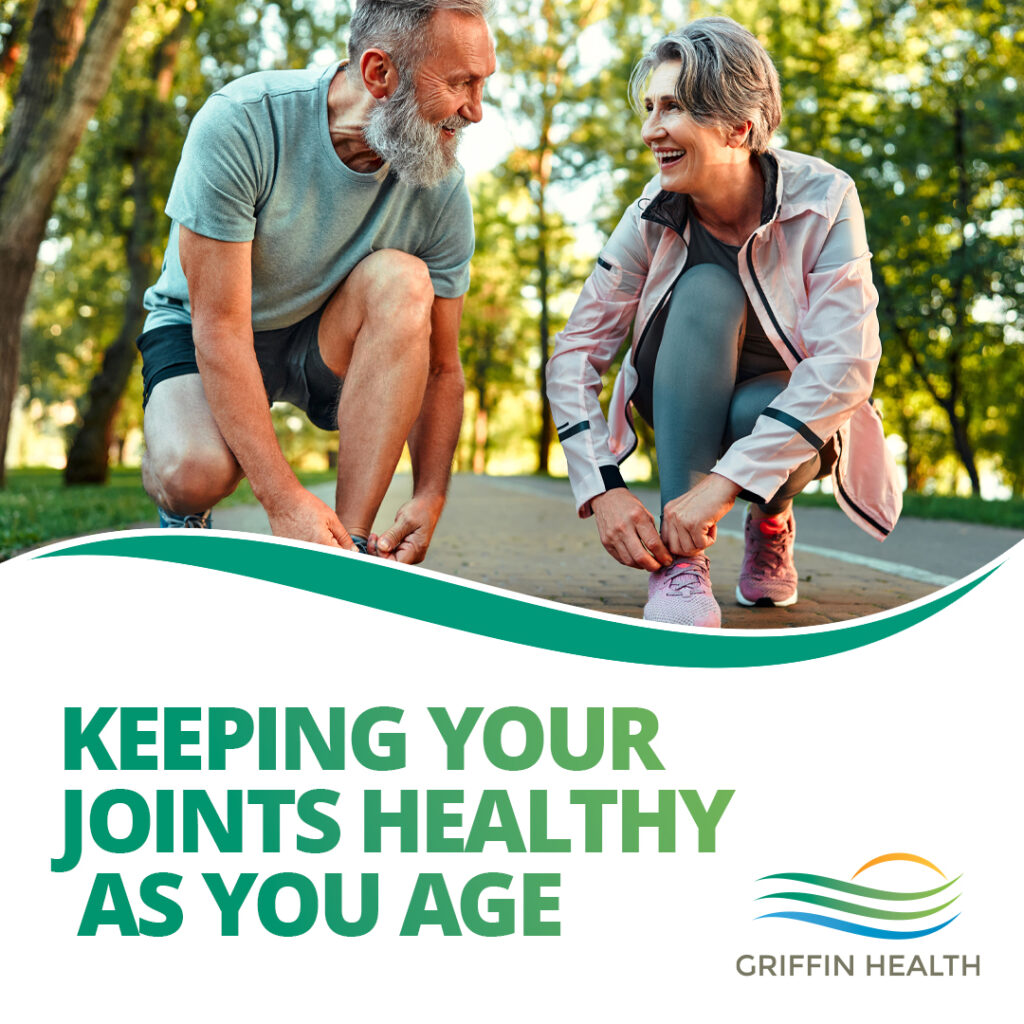
by Griffin Health Communications Intern Celina Daigle
As we age, our posture and walking patterns change, cartilage wears away, bones lose mass and density, and fluid in our joints decrease. This can cause pain, stiffness, and a lower range of motion. Understanding how aging affects our joints and how to manage joint health can help us maintain and potentially improve our quality of life.
What is a Joint?
Joints are where bones, ligaments, tendons, cartilage, bursae sacs, and synovial membranes come together. Ligaments connect bones. Tendons attach muscle to bones. Cartilage covers the surface of bone to reduce friction. Bursae sacs are filled with fluid to act as a cushion between bones and synovial membranes produce fluid and lubricate the joint.
Joint Disorders as We Age
When these connections wear down with age, we experience joint disorders. Osteoarthritis is one of the most common joint disorders, affecting an estimated 32.5 million adults in America. Due to consistent stress on the joints from high impact exercises, repeated motions, injury, or being overweight, cartilage in stiffens and begins to wear away, leading to bone damage.
Another significant joint disorder is Rheumatoid Arthritis (RA). This autoimmune disease mostly affects adults and causes the body to attack healthy joint cells, resulting in swelling and pain. Routine check-ups and physicals with a primary care provider or an orthopedist are critical to treating joint disorders, as they can diagnose the cause for joint pain and discuss ways to manage discomfort and maintain a healthy lifestyle.
Tips for Joint Health
Consulting a doctor is a great step towards addressing joint concerns. Here are proactive steps that can be taken at home to support joint health and minimize the effects of natural wear and tear caused by aging.
Stay Hydrated – Drinking more water to maintain a proper level of hydration is crucial to joint health. About 80% of cartilage is composed of water. When the body is not well hydrated, water can be pulled from areas such as the joints, reducing joint lubrication and leading to increased friction between cartilage and bones causing the material to wear down.
Focus on Nutrition – Maintaining a healthy diet with a focus on certain vitamins is very important as we age. Menopausal women and men over 70 should get 1,200 milligrams of calcium and 800 international units of Vitamin D daily for optimal joint health. Eating broccoli, spinach, kale and other greens along with daily multivitamins are good ways to increase calcium along with other beneficial nutrients, including Vitamin K for bone health, Vitamin C for tissue repair, and Vitamin E for pain relief. Decreasing caffeine intake and quitting tobacco can dramatically improve bone and joint health as high intake levels of these have been shown to decrease bone strength and lead to fractures.
Stay Active with Low-Impact Exercises – Low impact exercises in proper supportive footwear are critical to joint health. Shoes with flexible rubber soles that allow for cushion and foot support will help keep you safe from injury while taking part in some low impact exercises such as cycling, swimming, and yoga.
Warm up and Stretch – Before performing any exercise, warming up muscles with light cardiovascular exercises, range of motion exercises and stretching helps prevent injury. Adding in non-strenuous weight to workout routines can also help manage and prevent further damage to joints by strengthening the surrounding muscles which will keep you moving and feeling energized.
Griffin’s Commitment to Exceptional Joint Care
The Center for Joint Health at Griffin Hospital offers a personalized, focused approach to joint care and treatment. The Center features a dedicated team of orthopedic care specialists that is highly skilled and experienced in caring for joint replacement patients, comprehensive patient education prior to surgery, education for family and friends who may participate as Care Partners in the recovery process, and a coordinated after-care program. Visit griffinhealth.org/joint for more information.